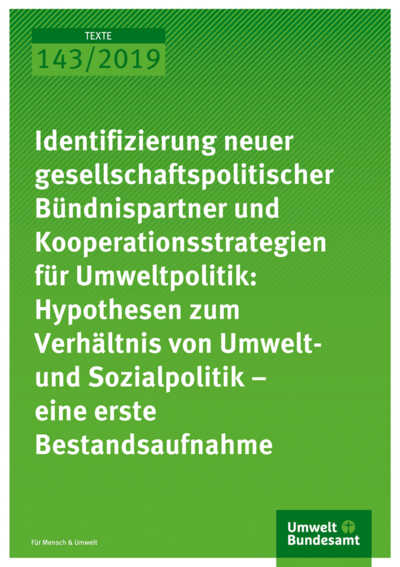Identifying new societal allies and cooperation strategies for environmental politics Hypotheses on the relation between environmental and social policy – a first assessment
Do environmental and social policy actors share common perspectives in their respective agendas? Around which issues are environmental policy actors, trade unions, social policy and welfare associations pulling together in the same direction and where is it more like a tug of war?
The discussion paper aims at investigating these questions. As a first step, hypotheses about the links between environmental and social policy were formulated. Based on these hypotheses, the authors analyzed the agendas and activities of selected non-governmental social policy actors (trade unions, social policy and welfare associations) as well as state environmental actors. The analysis reveals that socio-economic effects of environmental policies (or the absence of environmental policies) have become a key component of the environmental policy agenda already. However, there has yet been little discussion on less quantifiable social effects of environmental policy. On the part of the social policy actors, the analysis showed that they are indeed increasingly integrating environmental concerns in their daily business (such as through the establishment of environmental management systems) and in their core activities (such as offering trainings in environmental topics). Furthermore, social policy actors are more and more often voicing their perspectives on environmental issues publicly, ranging from consenting perspectives with regard to the 1.5 degree-target to more reserved stances that emphasize the urgent priority of social compatibility with regard to environmental policies.
In a second step, the authors examined to what extent an initiation of new alliances or other cooperative activities between environmental and social policy organization could be observed in the recent past or are currently ongoing. Of particular interest were the issue areas as well as settings of the activities. The analysis shows that most of the social policy actors have indeed cooperated with environmental actors at some point before. Those cooperative activities, which are often on a vague, discursive rather than tangible level, usually aim at presenting the common claims and interest towards the legislator. Especially in the most recent past, quite a variety of these more discursive alliances could be observed, e.g. the big rally by the Industrial Metal union IG Metall under the theme ‘#FairWandel’ (literally “fair change” or “just transition”) in June 2019 where also other social policy and environmental organizations were involved. Nonetheless, these alliances tend to be rather short-lived without any substantial follow-up activities. Long-term cooperation would require new approaches that address common strategies for transformation beyond a mostly vague consent to rather abstract aims of climate protection or social justice and also take into account specific contexts of different sectors or spatial levels.



